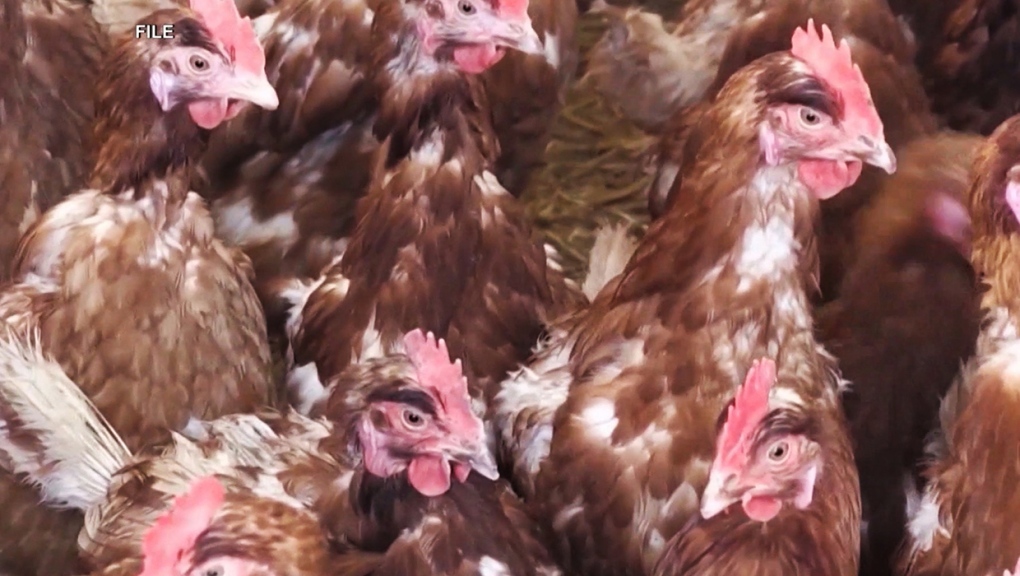‘It’s definitely a concern for us:’ Avian flu suspected behind death of geese in Coaldale
 The Birds of Prey Foundation in Coaldale says it’s normal to find one or two deceased ducks or geese each spring, but managing director Colin Weir recently discovered six dead geese. He believes the deaths may have been caused by the avian flu.
The Birds of Prey Foundation in Coaldale says it’s normal to find one or two deceased ducks or geese each spring, but managing director Colin Weir recently discovered six dead geese. He believes the deaths may have been caused by the avian flu.
The Canadian Food Inspection Agency (CFIA) has released data that shows 13 farms in central and southern Alberta have confirmed cases of the avian influenza as the deadly bird flu continues to spread across Canada and the globe.
Each infected area in the province has been placed under quarantine and the CFIA is investigating, but the disease may already be spreading to other birds in the area.
The Birds of Prey Foundation in Coaldale says it’s normal to find one or two deceased ducks or geese each spring, but managing director Colin Weir recently discovered six dead geese. He believes the deaths may have been caused by the avian flu.
“We're getting a few phone calls from people just inquiring about ducks and geese that are showing a little bit of odd behaviour, you know like maybe being a bit unsteady on their feet or not flying away when they're approached by people or dogs,” said Weir.
It’s also feared the disease could impact other bird species at the foundation like hawks, falcons or eagles at a time when the doors are getting set to open for another season at the Birds of Prey in just a few weeks time.
 Avian flu has already been detected in 13 Alberta poultry flocks -including in the Cardston and Warner counties.
Avian flu has already been detected in 13 Alberta poultry flocks -including in the Cardston and Warner counties.
“It’s definitely a concern for us,” said Weir.
“If we're accepting any new birds this spring, we're just going to monitor them week by week, then they’d have to be quarantined and kept separate from the other birds we have on site.”
DEVASTATED FARMS
Avian flu has already been detected in 13 Alberta poultry flocks, including in the Cardston and Warner counties. One of Canada’s biggest and oldest duck farms has been devastated by the disease. Quebec's Brome Lake Ducks is being forced to destroy 150,000 birds, along with 400,000 eggs. 95 per cent of its workforce is being laid off. Producers are urged to be prepared.
“Small flock owners are encouraged to confine their birds indoor if at all possible during this high risk period of wild bird migrations, and of course, commercial poultry owners are urged to follow and continue following strict biosecurity protocols,” said Manitoba chief veterinary officer Dr. Scott Zaari.
Humans can also play an impactful role in reducing the spread of infection among birds.
“Maybe it’s not the best time to be feeding the animals, especially as spring is sprouting. We've got some food that is coming up in natural settings,” said Wildlife Haven executive director Zoe Nakata.
“We're advising people if you're going to the duck pond, wash your shoes and be careful what you're tracking.”
Colin Weir with Birds of Prey said there hasn't been any documented cases of the avian flu spreading from birds to humans but the threat of infection is serious for any small operations or flocks.
Mayor of Coaldale Jack Van Rijn says he has contacted provincial and federal agencies to have the geese found dead at Birds of Prey monitored and possibly tested.
CTVNews.ca Top Stories

Second Cup closes Montreal franchise over hateful incident
Second Cup Café has closed one of its franchise locations in Montreal following allegations of hateful remarks and gestures made by the franchisee in a video that was widely circulated online during a pro-Palestinian protest on Thursday.
‘It’s pretty emotional:’ N.B. family escape fire, plan to rebuild home
A family in Riverview, N.B., is making plans for Christmas and the future after escaping a fire in their home on November, 14.
'Still working full time on it:' One year later police continue to search for gunman in Caledon double murder linked to ex-Olympian
One year after a couple was shot and killed in their Caledon home in what investigators have described as a case of mistaken identity, Ontario Provincial Police say they are still trying to figure out who pulled the trigger.
Scurvy resurgence highlights issues of food insecurity in Canada's rural and remote areas
A disease often thought to only affect 18th century sailors is reemerging in Canada.
B.C. man awarded $800K in damages after being injured by defective bear banger
A B.C. man has been awarded nearly $800,000 in damages as compensation for injuries he sustained from a defective bear banger, according to a recent court decision.
Cargo ship runs aground in St. Lawrence River near Morrisburg, Ont.
A large cargo ship remains stuck in the St. Lawrence River after running aground on Saturday afternoon.
A man called 911 for help during a home invasion. Las Vegas police fatally shot him
A Las Vegas man called for police help during a home invasion before an officer fatally shot him, according to authorities and 911 calls.
These royal residences are opening their doors this Christmas
Not so long ago, if you wanted to spend Christmas with the royal family, the only way to get close was to press your nose up to the TV screen during the monarch’s Christmas speech.
Cat caught in hunting snare rescued by BC SPCA
Donations are ramping up for a BC SPCA cat with a mangled paw after being caught in a hunting snare, one of a rising number of pets to fall prey to the hunting device.






























